Reform and Conservative Jews in Israel: A Profile and Attitudes
What percentage of Jews in Israel define themselves as Reform or Conservative? What is their ethnic origin? Do they see themselves as being on the political and economic Right or Left? This article provides a glimpse into denominations of Judaism that exist in Israel, but for which there is very little current data.
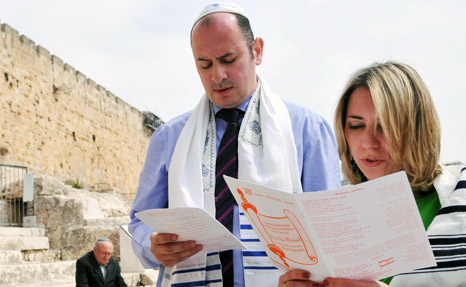
Introduction
The Reform and Conservative movements are major components of Jewish communities in the Diaspora, especially in the United States. However, in Israel, the number of Jews who identify with these denominations is not large and empirical information on their profile is very limited. In order to compensate somewhat for what is missing, we decided to use the data of the 2013 Israeli Democracy Index in order to draw, in broad strokes, a general profile of the demographics and attitudes of Reform and Conservative Jews in Israel. We note at the outset that for some of the questions examined, the small number of survey respondents who defined themselves as belonging to these two denominations (N = 60) does not enable us to draw conclusive and statistically significant conclusions. This underlines the need for continued research that will study a greater number of respondents from these groups in order to characterize them more accurately.
How Many Reform and Conservative Jews are there in Israel?
The first question we examined was "Do you feel that you belong to one of the denominations of Judaism, and if so, to which one? The findings show that 3.2% of respondents see themselves as affiliated with the Conservative movement, 3.9% affiliate with the Reform movement, 26.5% affiliate Orthodox, and the rest do not feel that they belong to any denomination (9.7% said that they did not know or declined to answer the question). In other words, Reform and Conservative Jews together constitute 7.1% of the Jewish Israeli public, and their demographic weight is thus a quarter of that of the Orthodox community. These proportions appear to be reliable, since in A Portrait of Israeli Jews: Beliefs, Observance, and Values of Israeli Jews 2009, the third Guttman-AVI CHAI survey, 3.8% of respondents described themselves as Reform and 3.8% defined themselves as Conservative. The similarity between the findings of the current survey and the Guttman-AVI CHAI survey on this question shows that the demographic size of these two groups in the Israeli-Jewish public is indeed approximately 7–8%.
Do You Feel that You Belong to One of the Denominations of Judaism? If So, to Which One? (%)
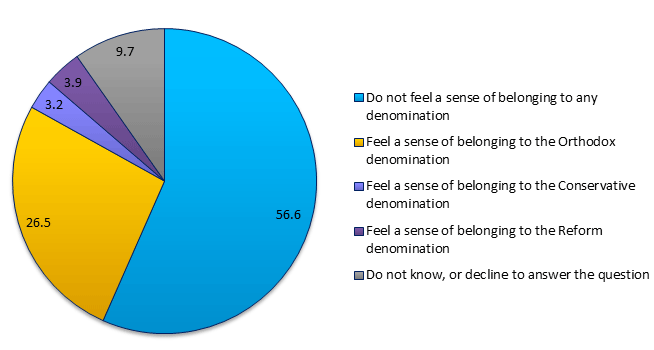
What are the Ethnic Origins of Reform and Conservative Jews in Israel?
There is a tendency to assume that most of those who define themselves as Reform and Conservative in Israel come from English speaking countries, especially the United States. For this reason, we broke down those who identified themselves as Conservative or Reform by ethnic origin.
The data in the current survey show that the proportion of respondents of European and American origins (either immigrants to Israel or children of immigrants from those countries) among Reform and Conservative Jews was higher than the average of the entire sample (38% of Reform and 33% of Conservative Jews, compared to 25% of Jews of European or American origins in the entire sample). However, the rate of respondents of Asian and African origins who consider themselves Reform or Conservative was also greater than their proportion in the total sample (25% Reform and 25% Conservative, compared to 19% of respondents of Asian and African origins in the total sample). In contrast, the rate of respondents with origins in the former Soviet Union, as well as individuals born in Israel and whose parents were born in Israel among the Reform and Conservative Jews was relatively low as compared to their rate in the total sample.
The 2009 Guttman-AVI CHAI survey found that the ethnic distribution of those who defined themselves as Reform and Conservative was similar to the ethnic distribution of the total sample. While the disparity between the two samples calls for continued research, the two surveys together lead to the conclusion that it is not that Anglo-Saxons tend to lean toward the Reform and Conservative movements more than other groups, but rather that in Israel, these two denominations of Judaism are diverse in terms of the ethnic origins of those affiliated with them. There is room, therefore, for further research to examine whether any local-Israeli Reform or Conservative congregations have been established that are not just based on "imported" behavior and traditions from English-speaking countries.
Affiliation with One of the Denominations of Judaism,
By Ethnic Origin (%)
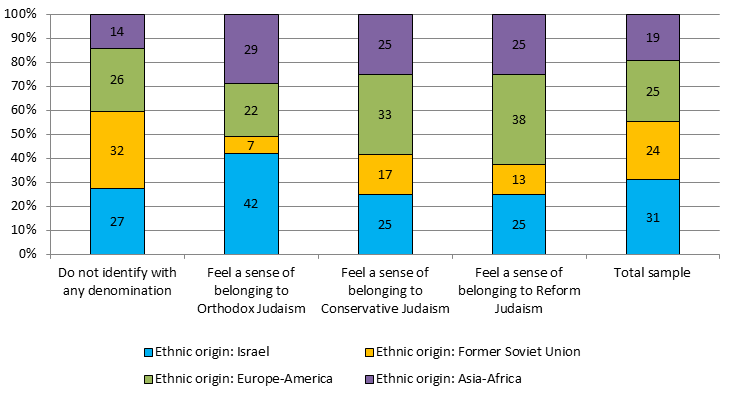
Are Reform and Conservative Jews "Religious" and if so, to What Extent?
The accepted scale for defining levels of religiosity in Israel distinguishes between ultra-Orthodox, religious, traditional, and secular Jews We were interested in understanding what the dominant definitions of levels of religiosity are among Reform and Conservative Jews in Israel. To this end, we broke down these two groups based on the results of a question in the questionnaire that presented the accepted scale for defining levels of religiosity.
The data show that most of the respondents who define themselves as Conservative (67%) describe themselves as "traditional," while those who define themselves as Reform are almost evenly split between those who define themselves as "traditional" (41%) and those who define themselves as "secular" (41%). The rate of respondents in both groups who define themselves as "religious" is approximately 10%. The Guttman-AVI CHAI survey of 2009 also found that there is a particularly high rate of Conservative Jews who describe themselves as "traditional" (62%), while among Reform Jews there is a higher proportion of individuals who describe themselves as "secular" (66%). The percentage of those who defined themselves as “religious” in the 2009 survey was 2% among Conservatives and 1% among those who defined themselves as Reform. This gap between the two surveys also calls for continued research. However, despite the differences between the studies, it is clear that Reform and Conservative Jews in Israel tend not to define themselves as "religious."
Affiliation with One of the Denominations of Judaism,
By Religiosity (%)
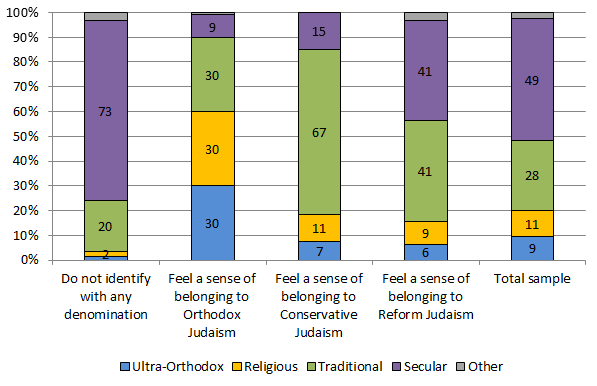
Are Reform and Conservative Jews on the Economic Left or Right?
An analysis of responses to the question "On a scale ranking socio-economic systems from 1 to 5, in which 1 indicates a system in which the state greatly intervenes in socio-economic issues—i.e., social democracy—and 5 indicates a system in which the state does not intervene at all in matters of economy, society, and the free market—i.e., capitalism—where do you position the system that you prefer?"For purposes of clarity, we combined categories 1 and 2 into "supports social democracy," we called category 3 "medium position," and we combined categories 4 and 5 into "supports a free market." An analysis based on self-definition of religiosity reveals that as compared to the total sample, among those who identified themselves as Reform there is a stronger tendency to have social-democratic economic views (50% of respondents who identified themselves as Reform expressed support for social-democratic policy, as compared to 39% of the total sample). Among Jews who identified themselves as Conservative, however, the distribution is similar to the distribution of the total sample, with a slightly stronger tendency to the center (the moderate positions were held by 46% of respondents who identified themselves as Conservative and 41% of the total sample).
Affiliation with One of the Denominations of Judaism,
By Economic-Social Attitude (%)
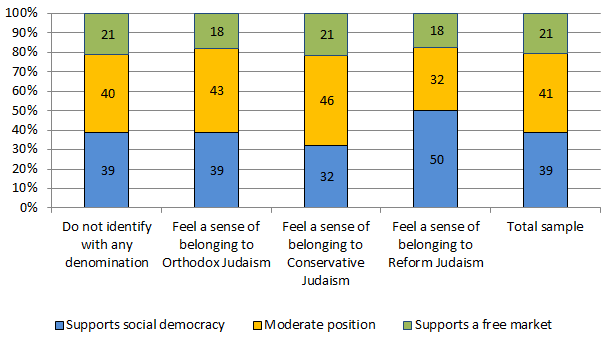
Are Reform and Conservative Jews in Israel on the Political-Security Right or Left?
An analysis of denominations based on responses to the question: "From a political-security perspective, how would you describe yourself?" shows that similar to the findings of the 2009 Guttman-AVI CHAI survey, in comparison to the total sample, in the current survey respondents who identify themselves as Conservative identify slightly more with the political right (67% of those who define themselves as Conservative defined themselves as Right, compared to 56% of the total sample). Conversely, as in the 2009 study, those who define themselves as Reform tend to identify themselves less with the political Right than members of any other denomination, and they have a stronger presence in the Center and even a slightly greater presence in the Left (42% of Reform Jews identify with the Center, in contrast to 27% of the total sample, while 19% of Reform Jews identify with the Left, in contrast to 18% of the entire sample).
Affiliation with One of the Denominations of Judaism,
By Political-Security Attitudes (%)
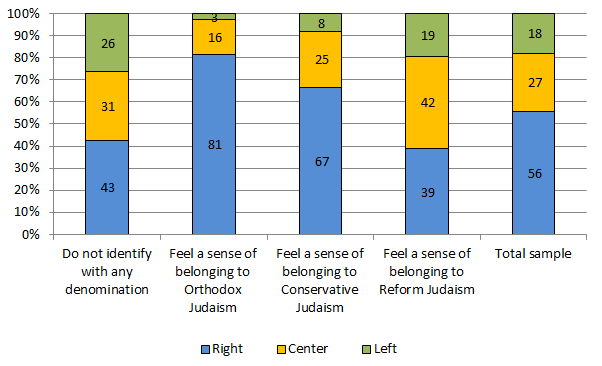
Who Supports Equalizing the Status of all Jewish Denominations in Israel?
Lastly, we sought to examine which groups in Israel today support or oppose granting the Reform and Conservative movements in Israel equal status to that of Orthodox Judaism in Israel.
Overall, 59% of the respondents supported equalizing the status of the different denominations and 41% opposed such a change. As expected, those who identify themselves as Reform or Conservative are more likely to support equalization (72% of Reform Jews and 70% of Conservative). In contrast, only a minority (27%) of respondents who identify themselves as Orthodox tend to support such a move. Respondents who identified with the political Left and Center were found to be more supportive of equalizing the status of the denominations than respondents who identified with the Right (84% of those who identified with the Left and 76% of those who identified with the Center support equalizing the status of the denominations, compared to 44% of respondents on the Right).
As expected, self-definition of level of religiosity is also associated with the degree of support for equalizing the legal status of the Conservative and Reform movements in Israel. Only a minority of those who defined themselves as Haredi and religious (17% and 31%, respectively) supported equalization, as compared to approximately half of those who defined themselves as traditional (53%) and most (78%) of those who defined themselves as secular.
A breakdown by age indicates that there is less support among the younger generation for equalizing the legal status of the denominations: 51% of respondents aged 18–34 support equalization, as compared with 61% of respondents aged 35–54 and 66% of respondents aged 55 and older. A possible explanation for this difference between the age groups is the greater demographic presence of religious and Haredi respondents in the younger age groups of the survey.
An analysis based on ethnicity shows that second-generation Israelis and respondents of Asian and African origins tend to be less supportive of equalizing the status of denominations than respondents with origins in the former Soviet Union, the United States, and Europe (51% of respondents of Asian and African origins supported equalization, 56% of second-generation Israelis, 62% of respondents with origins in the former Soviet Union, and 69% of respondents of European and American origins).
Support for Equalizing the Legal Status of Reform and Conservative
Movements in Israel with that of Orthodox Judaism,
By Different Population Groups (%)
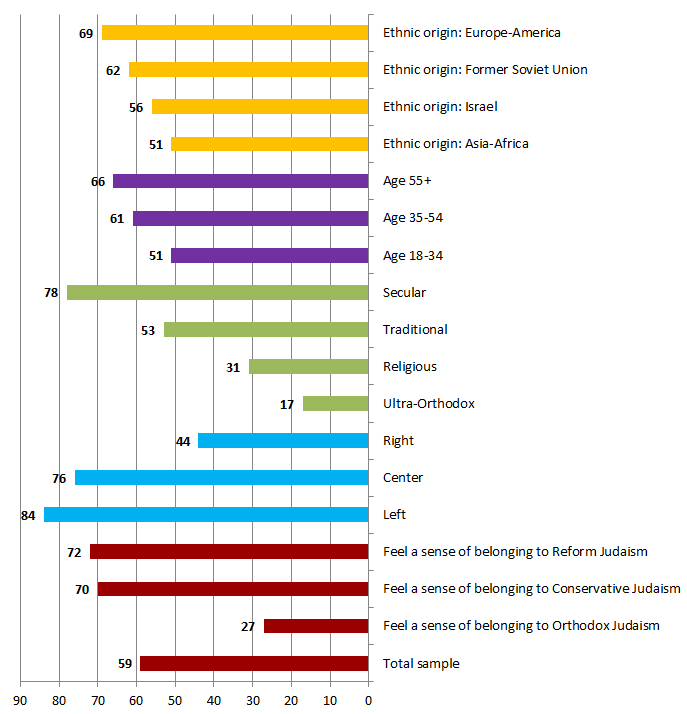
Data for this article are from the survey of The Israeli Democracy Index 2013, which was conducted on April 8, 2013 through May 1, 2013. The sample included 854 respondents who are a representative sample of the adult Jewish population in the State of Israel.
Prof. Tamar Hermann is a Senior Fellow at the Israel Democracy Institute and the Academic Director of IDI's Guttman Center for Surveys. Chanan Cohen is conducting research as part of the Guttman Center staff.
